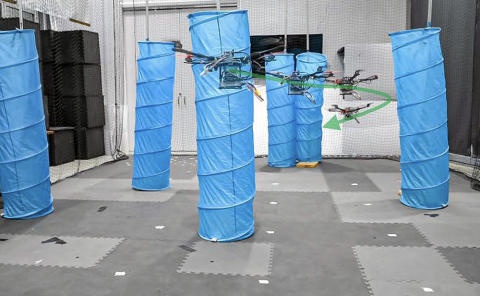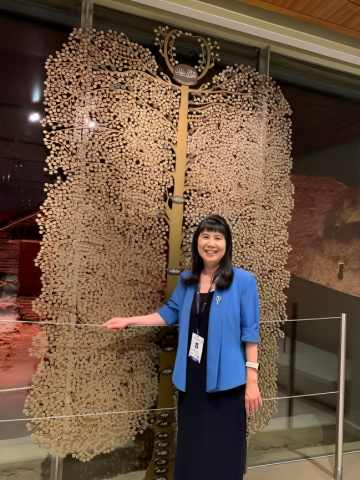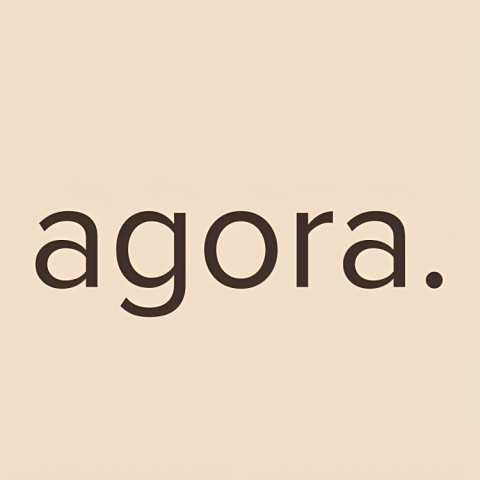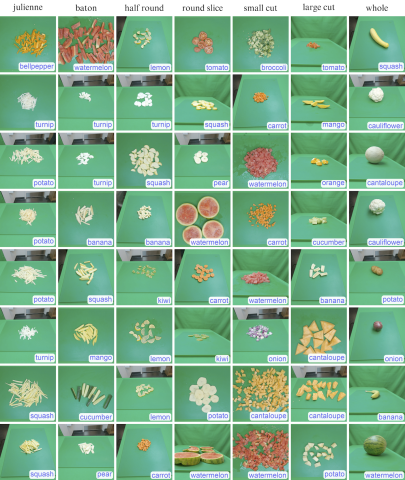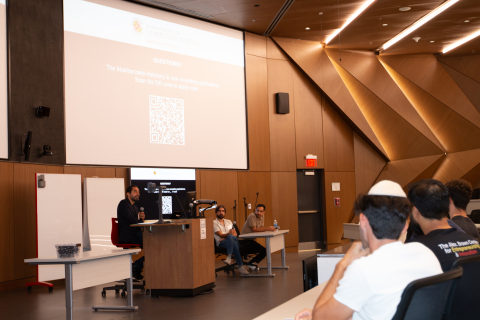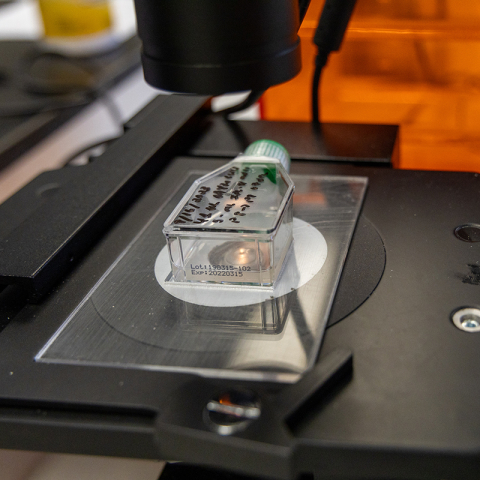Recent News & Accomplishments
2023
UMD Robotics has risen to 10th in the US, according to the 2023 rankings on csrankings.org.
University of Maryland Robotics is now ranked #10 in the US by the website csrankings.org . Previously, UMD was ranked #11; this new 2023 ranking means the university has cracked the “top 10.” CSRankings is a metrics-based ranking of top computer science institutions around the world and is popular in the broad CS and AI community. The model identifies institutions and faculty actively engaged in research across various areas of computer science based on the number of publications by faculty that have appeared at the most selective computer science conferences. Csrankings.org has a FAQ page... read more
UMD's Department of Computer Science reflects on five decades of tremendous growth.
Hundreds gathered to commemorate the University of Maryland Department of Computer Science’s 50th anniversary on October 7, 2023. The celebration —filled with reflections, forward-looking discussions and honorary events—showcased the remarkable journey of a department that began with just a handful of faculty members and students in the early ’70s and is now a highly esteemed and top-ranked program. Throughout the day, more than 500 alums, students, faculty and staff members, and distinguished guests attended engaging panel discussions, inspiring keynote sessions and guided tours of the... read more
Lin details Amazon career and team's emphasis on 3D technology in interview with Amazon.
Tell us about your Amazon career journey. I have been with Amazon as a Scholar since 2020. Although I have worked closest to my teammates in Fashion Technology, I have also worked with AWS and Imaging Sciences Teams on designing and developing various technologies for image-based retrieval, 3D body and geometry (including garment) reconstruction, material recovery, personnel promotions, and more. I also work with the Amazon Science team to help recruit scholars, postdocs, and interns and to evaluate proposals on novel technology concepts and center activities. Tell us about your team and your... read more
REtrieval-Augmented Audio CAPtioning (RECAP) has a unique ability to caption previously unheard audio events and intricate multi-sound audios.
In a paper submitted to the arxiv server, researchers from the University of Maryland proposed REtrieval-Augmented Audio CAPtioning (RECAP), a novel technique to enhance audio captioning performance when generalizing across domains. The research team, led by Department of Computer Science Professors Ramani Duraiswami and Dinesh Manocha and including master's students Chandra Kiran Reddy Evuru , Sreyan Ghosh and Sonal Kumar , conducted a study that showcases RECAP's performance on benchmark datasets. The study highlights its unique ability to caption previously unheard audio events and... read more
A study done by Associate Professor Sohiel Feizi and his team shows that it's pretty easy to evade watermarks.
A traditional watermark is a visible logo or pattern that can appear on anything from the cash in your wallet to a postage stamp, all in the name of discouraging counterfeiting. You might have seen a watermark in the preview to your graduation photos, for example. But in the case of artificial intelligence, it takes a slight twist, as most things in the space usually do. In the context of AI, watermarking can allow a computer to detect if text or an image is generated from artificial intelligence. But why watermark images to begin with? Generative art creates a prime breeding ground for the... read more
Derived from the ancient Greek term for ‘marketplace,’ agora is not just an app; it’s a transformation in meal planning.
It's no surprise that the current wave of tech innovation originates from hubs like Silicon Valley. But now, a dynamic duo of undergraduates at the University of Maryland (UMD) are showing that innovative solutions can emerge from university halls on the East Coast. Today, as third-year computer science undergrads, Pranav Dulepet (B.S. '25, computer science) and Mukund Shankar (B.S. '25, computer science) are on the brink of transforming meal planning with their innovative startup, agora . Derived from the ancient Greek term for ‘marketplace,’ agora is not just an app; it’s a transformation... read more
The innovative concept is a dataset that teaches machine learning systems to recognize 20 different types of fruits and vegetables in various forms.
While significant advancements have been made in computer vision the past few years, teaching a computer to identify objects as they change shape remains an Achilles heel in the field, particularly with generative artificial intelligence (AI) systems. Computer science researchers at the University of Maryland have come up with an innovative project to tackle this problem, using objects that we alter everyday—fruits and vegetables. Their end product is Chop & Learn, a dataset that teaches machine learning systems to recognize 20 different types of fruits and vegetables in various forms—... read more
Grant funds bilingual capabilities of health chatbot for moms of babies.
A University of Maryland chatbot under development to help bleary-eyed new moms manage the uncertainty of caring for a baby will soon field questions in both English and Spanish, thanks to a new grant from the National Institutes of Health. The AI-based app called Rosie aims to bridge the divide in care for new mothers and babies of color by providing 24-hour, validated health information on topics ranging from medication dosages to major milestones and recognize signs of postpartum depression. It initially received a $3.7 million NIH grant in 2021; the additional $200,000 awarded last month... read more
Established in 2021, the Mokhtarzada Hatchery supports UMD students in conceptualizing and launching startups.
The Mokhtarzada Hatchery Program in the University of Maryland's Department of Computer Science revealed the student teams selected for the 2023-24 academic year. Established in 2021, the Mokhtarzada Hatchery supports University of Maryland students in conceptualizing and launching startups. Nestled within the Brendan Iribe Center for Computer Science and Engineering, the Hatchery offers aspiring entrepreneurs with workspaces, mentorship and the opportunity for annual funding of up to $10,000 per team. The Mokhtarzada Hatchery Program is generously funded by UMD alumni and siblings Haroon,... read more
The ambitious technology is paving the way for devices to have a sense of smell.
The phrase “got your nose,” often accompanied by the pretend seizing of the nose, is part of a quaint childhood game. But wouldn’t it be quite useful if we really could transport our sense of smell elsewhere to help recognize different fragrances or even odors that we do not typically detect? If we could safely use the sense of smell to identify unfamiliar scents in our surroundings, we could be alerted to potential dangers like chemical spills or even trace the location of a lost person. This is the ambitious goal of the “bio-nose” project led by mechanical engineering professor Elisabeth... read more
